By: Imaam Yakhsyallah Mansur
بِسْمِ اللَّهِ الرَّحْمَنِ الرَّحِيم
First Sermon:
إنَّ الـحَمْدَ لِلّٰهِ نَـحْمَدُهُ وَنَسْتَعِيْنُهُ وَنَسْتَغْفِرُهُ، وَنَعُوذُ بِاللّٰهِ مِنْ شُرُورِ أَنْفُسِنَا وَمِنْ سَيِّئَاتِ أَعْمَالِنَا مَنْ يَهْدِهِ اللَّهُ فَلَا مُضِلَّ لَهُ وَمَنْ يُضْلِلْ فَلَا هَادِيَ لَهُ، أَشْهَدُ أَنْ لاَّ إِلَهَ إِلاَّ الله وَحْدَهُ لَا شَرِيْكَ لَهُ، وَأَشْهَدُ أَنَّ مُـحَمَّداً عَبْدُهُ وَرَسُولُه، اللّٰهُمَّ صَلِّ و سَلِّمْ وَبارِكْ عَلَى سَيِّدِنا مُحَمّدٍ وَعَلَى اٰلِه وَأصْحابِهِ وَالتَّابِعينَ بِإحْسانِ إلَى يَوْمِ الدِّين، أَمَّا بَعْدُ: فَيَا أيُّهَا الإِخْوَة أوْصُيْكُمْ وَنَفْسِيْ بِتَقْوَى اللهِ وَطَاعَتِهِ لَعَلَّكُمْ تُفْلِحُوْنْ، قَالَ اللهُ تَعَالىَ فِي اْلقُرْانِ اْلكَرِيمْ: يَا أَيُّهَا الَّذِينَ آمَنُوا اتَّقُوا اللَّهَ حَقَّ تُقَاتِهِ وَلَا تَمُوتُنَّ إِلَّا وَأَنْتُمْ مُسْلِمُونَ، وَقَالَ الَنَّبِيُ صَلَّى اللّٰهُ عَلَيْهِ وَسَلَّمَ .فَإِنَّ خَيْرَ الْحَدِيثِ كِتَابُ اللَّهِ، وَخَيْرَ الْهَدْيِ هَدْيُ مُحَمَّدٍ، وَشَرَّ الأُمُورِ مُحْدَثَاتُهَا، وَكُلَّ مُحْدَثَةٍ بِدْعَةٌ، وَكُلَّ بِدْعَةٍ ضَلاَلَةٌ، وَكُلَّ ضَلاَلَةٍ فِي النَّارِ.
Also Read: Verses of the Universe in Gaza: The Unyielding Light of Faith
On the occasion of this Friday sermon, the preacher invites himself, his family and all audience, let us always maintain and increase our faith and piety to Allah Subhanahu wa Ta’ala.
It is appropriate that a servant is grateful to his Lord for all the blessings and gifts he has received. The best form of gratitude is to use the favors and gifts in accordance with the orders of the giver of favors, namely to worship Him.
Sincere worship for Allah Subhanahu wa Ta’ala is the highest form of gratitude for a servant. Therefore, let us continue to try to carry out the commands of Allah Ta’ala and we stay away from all His prohibitions as a form of our gratitude to Him.
Maasyiral Muslimin, hafidzakumullah Ta’ala
Also Read: Prophet Sulaiman Alaihi Salam, the Greatest Muslim King of All Time
Let us meditate on the words of Allah Subhanahu wa Ta’ala contained in surah Ibrahim [14] verse 40, which reads:
رَبِّ ٱجْعَلْنِى مُقِيمَ ٱلصَّلَوٰةِ وَمِن ذُرِّيَّتِى ۚ رَبَّنَا وَتَقَبَّلْ دُعَآءِ (ابراه يم [١٤]: ٤٠)
Prophet Ibrahim prayed “O my Lord, make me and my children and grandchildren those who continue to pray, O our Lord, please allow my prayer.”
The author of Jalalain’s commentary, Imam Jalaluddin Al-Mahalli and Jalaluddin As-Suyuthi explained, Prophet Ibrahim Alaihi greetings in his prayer used the expression “min dhurriyatii” which shows the meaning of some of his descendants, because Allah Ta’ala had informed him that among his descendants there would be people who rejected the law he brought.
Also Read: Imaam Yakhsyallah Mansur: Surah At-Tin Indicates the Command to Liberate Al-Aqsa
In particular, Prophet Ibrahim Alaihi Salam mentioned prayer in his prayer, because it is themain thing in religion, which is the benchmark for the success or failure of human life.
Prayer is one of the most important pillars in Islam. Whoever upholds prayer means he is upholding religion, and whoever neglects it is actually undermining religion. Prayer is also the difference between a believer and a non-believer.
Prayer is a form of dhikr, as well as a form of gratitude for a servant. If a servant performs prayer with perfect observance of the conditions and pillars, then he is among those who are always grateful to him. On the other hand, someone who neglects and misses prayer, then he is a negligent person and is part of the disbelievers.
Allah Subhanahu wa Ta’ala has also given a warning in surah Maryam [19] verse 59 which reads:
Also Read: Imaam Yakhsyallah: Nurture Love for the Prophet, One Will Be with Whom One Loves
فَخَلَفَ مِنْ بَعْدِهِمْ خَلْفٌ أَضَاعُوا الصَّلَاةَ وَاتَّبَعُوا الشَّهَواتَِ ۖ فَسَوْفَ يَلْقَوْنَ غَ يًّا (مريم [١٩]: ٥٩)
“Then come after them, substitutes who waste prayer and follow their lusts, then they will later meet astray.”
Some scholars say that the verse above is addressed to the people of Prophet Muhammad Shalallahu alaihi wasallam who were negligent by wasting prayers, did not practice the values of prayer in daily life, including not paying attention to the terms and pillars.
Maasyiral Muslimin, hafidzakumullah Ta’ala
Also Read: Friday Sermon: Emulating the Firmness of the Prophet in Struggle
Prayer should be the most important material in children’s education. Within the family sphere, parents have an important role in teaching prayer to their children.
In a hadith from Abdullah bin ‘Amr Radhiyallahu’ anhu’s friend, Rasulullah Shallallahu alaihi Wasallam said:
مُرُوْا أَ % نِيْنَ ، وَفَرِّقُوْا بَيْنَهُمْ فِي الْمَضَاجِعِ (رواه احمد وابوداود)
“Order your children to pray when they are seven years old and beat them (if they leave) prayer when they are ten years old and separate the beds between them (boys and girls).” (Reported by Ahmad and Abu Dawud)
Also Read: Imaam Yakhsyallah: Muslims Unity as Key to Victory of Islam
The hadith above explains how important it is to teach the Shari’a of prayer to children. With habituation from an early age, when they grow up it will be easy and accustomed to performing prayers and other orders.
Children are the most expensive and valuable investment for their parents. It is they who will continue the struggle of their parents, teachers, and seniors in preaching Islam.
Funding their education, in essence, is financing the Islamic religion, because they are the ones who will continue the da’wah relay, inheritors, successors, and enforcers of the monotheism sentence on this earth.
So for parents, don’t just look at the nominal amount of the monthly education fee, but think about the great and glorious reward from Allah Subhanahu wa Ta’ala because we become part of the people who care for and finance their religion.
Also Read: Friday Sermon: Prophet Muhammad Is Not a Political Figure
In the afterlife, a child will be able to save his parents from the torment of hell fire through his prayers and good deeds.
Maasyiral Muslimin, hafidzakumullah Ta’ala
To prepare the next generation and enforcers of prayer, there are several steps that can be taken:
First, provide a true understanding of the importance of prayer. Teach them terms and conditions. Also insert about the value and benefits of prayer in their lives. Give an explanation of the nature of the meaning of prayer, its primacy, the positive impact that will be obtained personally and socially and the negative impact if you ignore and leave it.
Also Read: Without Knowledge, Congregation Is Merely a Crowd Without Direction
About the importance of prayer, Rasulullah Shallallahu alaihi Wasallam said:
إنَّ أَوَّلَ مَا يُحَاسَبُ بِهِ العَبْدُ يَوْمَ القِيَامَةِ مِنْ عَمَلِهِ صَلَاتُهُ، فَإنْ صَلُحَتْ، فَقَدْ أَفْلَحَ وَأَنْجَحَ، وَإنْ فَسَدَتْ، فَقَدْ خَابَ وَخَسِرَ، فَإِنِ انْتَقَصَ مِنْ فَرِيْضَتِهِ شَيْءٌ، قَالَ الرَّبُ: اُنْظُرُوْا هَلْ لِعَبْدِيْ مِنْ تَطَوُّعٍ، فَيُكَمَّلُ مِنْهَا مَا انْتَقَصَ مِنَ الفَرِيْضَةِ ؟ ثُمَّ تَكُوْنُ سَائِرُ أعْمَالِهِ عَلَى هَذَا. (رَوَاهُ التِّرمِذِيُّ)
“Surely the first deed that will be accounted for a servant on the Day of Judgment is his prayer. So, if the prayer is good, indeed he has been lucky and successful. And if his prayer is broken, indeed he has failed and lost. If it is reduced by a little from the obligatory prayer, then Allah says: ‘See if My servant has sunnah prayers. Then so do all his deeds.” (Narrated by At-Tirmidhi)
Second, be a good role model for children in performing the five daily prayers. For male parents, it is highly emphasized to perform congregational prayers at the mosque. If the parents become mosque experts, it will be easy to order their children to go to the mosque.
Also Read: Friday Sermon: Grateful for Indonesia’s Independence by Supporting Palestine’s Freedom
Third, convey the principles of Islamic teachings, ethics, and other procedures for worship. It will help them understand and apply prayer as part of their life.
Fourth, involve them in religious activities. Invite the younger generation to be actively involved in programs at the mosque. Give them the opportunity to learn, interact, and work together with people who have a high commitment and passion for worship.
Fifth, give appreciation for every effort and achievement they make. Give them praise, appreciation, and other positive motivation so that it will increase their enthusiasm for prayer and other acts of worship. Instead give advice with gentleness and patience until they really understand and carry out the prayer properly and correctly.
Lastly, pray for our children, families and descendants to become the generation of upholders of prayer, successors of da’wah, upholders of monotheism and continuation of our prostrations on this earth. Amen O Lord of the Worlds.
Also Read: The Bestial Nature of Netanyahu
بَارَكَ اللهُ لِيْ وَلَكُمْ فِي الْقُرْآنِ الْعَظِيْمِ، وَنَفَعَنِيْ وَإِيَّاكُمْ بِمَا فِيْهِ مِنَ اْلآيَاتِ وَالذِّكْرِ الْحَكِيْمِ. أَقُوْلُ قَوْلِيْ هَٰذَا وَأَسْتَغْفِرُوا اللهَ الْعَظِيْمَ . اِنَّهٗ هُوَ الْبَرُّ الرَّحِيْمِ.
Second Sermon
اَلْحَمْدُ لِلّٰهِ الَّذِيْ اَمَرَنَا بِلُزُوْمِ اْلجَمَاعَةِ، وَنَهَانَا عَنِ اْلاِخْتِلَافِ وَالتَفَرُّقَةِ ، وَاْلصَّلَاةُ وَالسَّلآ مُ عَلٰى نَبِيِّ الرَّحْمَةِ، وَعَلٰى اٰلِهِ وَاَصْحَا بِهِ هُدَاةِ اْلاُمَّةِ، أَمَّا بَعْدُ. فَيَآيُّهَا اْلمُسْلِمُوْنَ، اُوْصِيْكُمْ وَنَفْسِى بِتَقْوَى اللهِ فَقَدْ فَازَ اْلمُتَّقُوْنَ، وَقَالَ اللهُ تَعاَلَى أَعُوْذُ بِاللّٰهِ مِنَ الَّشيْطَانِ الرَّجِيْم ،إِنَّ اللهَ وَمَلآئِكَتَهٗ يُصَلُّوْنَ عَلىَ النَّبِى يآ اَيُّهَا الَّذِيْنَ آمَنُوْا صَلُّوْا عَلَيْهِ وَسَلِّمُوْا تَسْلِيْمًا. اَللَٰهُمَّ صَلِّ عَلَى مُحَمَّدٍ وَعَلَى آلِ مُحَمَّدٍ كَمَا صَلَّيْتَ عَلَى إِبْرَاهِيْمَ وَعَلَى آلِ إِبْرَاهِيْمَ، إِنَّكَ حَمِيْدٌ مَجِيْدٌ. وَبَارِكْ عَلَى مُحَمَّدٍ وَعَلَى آلِ مُحَمَّدٍ كَمَا بَارَكْتَ عَلَى إِبْرَاهِيْمَ وَعَلَى آلِ إِبْرَاهِيْمَ، إِنَّكَ حَمِيْدٌ مَجِيْدٌ.
اَللهُمَّ اغْفِرْ لِلْمُؤْمِنِيْنَ وَاْلمُؤْمِنَاتِ وَاْلمُسْلِمِيْنَ وَاْلمُسْلِمَاتِ اَلاَحْيآءِ مِنْهُمْ وَاْلاَمْوَاتِ، اللّٰهُمَّ انْصُرْ اِخْوَانَنَآ الْمُجَاهِدِيْنَ فِى فِلِسْطِيْنِ وَفِى كُلِّ مَكَانٍ .اللّٰهُمَّ أَعِزَّ اْلإِسْلاَمَ وَاْلمُسْلِمِيْنَ وَأَذِلَّ الشِّرْكَ وَاْلمُشْرِكِيْنَ وَانْصُرْ عِبَادَكَ آْلمُوَحِّدِيْنَ وَانْصُرْ مَنْ نَصَرَ الدِّيْنَ وَاخْذُلْ مَنْ خَذَلَ اْلمُسْلِمِيْنَ وَ دَمِّرْ أَعْدَاءَ الدِّيْنِ وَاعْلِ كَلِمَاتِكَ إِلَى يَوْمَ الدِّيْنِ. اللّٰهُمَّ ادْفَعْ عَنَّا اْلبَلاَءَ وَاْلوَبَاءَ وَالزَّلاَزِلَ وَاْلمِحَنَ وَسُوْءَ اْلفِتْنَةِ وَاْلمِحَنَ مَا ظَهَرَ مِنْهَا وَمَا بَطَنَ مِنْ بَلَدِنَاهَذَا خآصَّةً وَسَائِرِ اْلبُلْدَانِ اْلمُسْلِمِيْنَ عآمَّةً ، يَا رَبَّ اْلعَالَمِيْنَ. رَبَّنَا ظَلَمْنَا اَنْفُسَنَا وَإنْ لَمْ تَغْفِرْ لَنَا وَتَرْحَمْنَا لَنَكُوْنَنَّ مِنَ اْلخَاسِرِيْنَ. رَبَّنَا آتِناَ فِى الدُّنْيَا حَسَنَةً وَفِى اْلآخِرَةِ حَسَنَةً وَقِنَا عَذَابَ النَّارِ.
عِبَادَاللهِ! إِنَّ اللهَ يَأْمُرُ بِاْلعَدْلِ وَاْلإِحْسَانِ وَإِيْتآءِ ذِي اْلقُرْبىَ وَيَنْهَى عَنِ اْلفَحْشآءِ وَاْلمُنْكَرِ وَاْلبَغْيِ يَعِظُكُمْ لَعَلَّكُمْ تَذَكَّرُوْنَ وَاذْكُرُوا اللهَ اْلعَظِيْمَ يَذْكُرْكُمْ وَاشْكُرُوْهُ عَلىَ نِعَمِهِ يَزِدْكُمْ وَلَذِكْرُ اللهِ أَكْبَرُ.
(T/RE1)
Mi’raj News Agency (MINA)












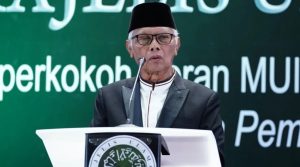

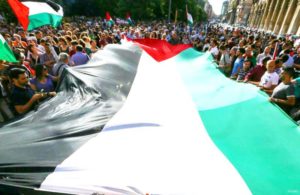

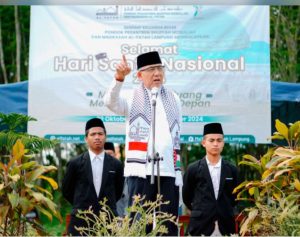


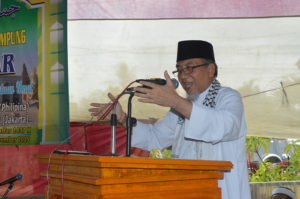
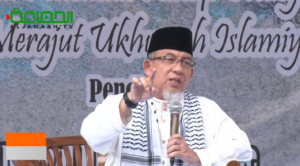
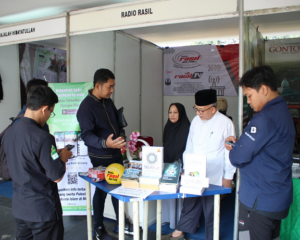












 Mina Indonesia
Mina Indonesia Mina Arabic
Mina Arabic